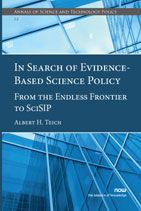In Search of Evidence-based Science Policy: From the Endless Frontier to SciSIP
By Albert H. Teich, Institute for International Science and Technology Policy, George Washington University, USA, ateich@gmail.com
Abstract
The federal government invests billions of dollars every year in scientific research. How to allocate this money among fields, institutions, researchers, and projects; how to nurture the talent needed to conduct research at the frontiers of science; how to assess the results of research; and how to translate those results into useful products and services — answering these questions and others are the jobs of science and innovation policy.
In a 2005 speech, presidential science adviser John H. Marburger III suggested that the science policy community was not equipped with tools for such jobs and challenged it to “grow up, and quickly” so it could provide useful guides to action in our “global, technology-based society.” Growing up has meant becoming more empirical, evidence-based, and, in many instances, quantitative.
This paper tracks the evolution of U.S. science policy research largely as it has been conducted in universities and supported by the National Science Foundation, from its beginnings in the early 1960s to the present time, from reliance on expert opinion to more systematic, empirical studies. It examines how a community developed, the growth and decline of federal support, the emergence of the SciSIP (Science of Science and Innovation Policy) program and the ways in which that program has fostered new approaches to science policy. It concludes that the tools and data sets being created by program researchers can have significant impacts on policy, not just in science and technology, but in other fields as well.
In Search of Evidence-based Science Policy: From the Endless Frontier to SciSIP
In Search of Evidence-Based Science Policy: From the Endless Frontier to SciSIP tracks the evolution of U.S. science policy research largely as it has been conducted in universities and supported by the National Science Foundation, from its beginnings in the early 1960s to the present time, from reliance on expert opinion to more systematic, empirical studies. It examines how a community developed, the growth and decline of federal support, the emergence of the SciSIP (Science of Science and Innovation Policy) program and the ways in which that program has fostered new approaches to science policy. It concludes that the tools and data set created by program researchers can have significant impacts on policy, not just in science and technology, but in other fields as well.
